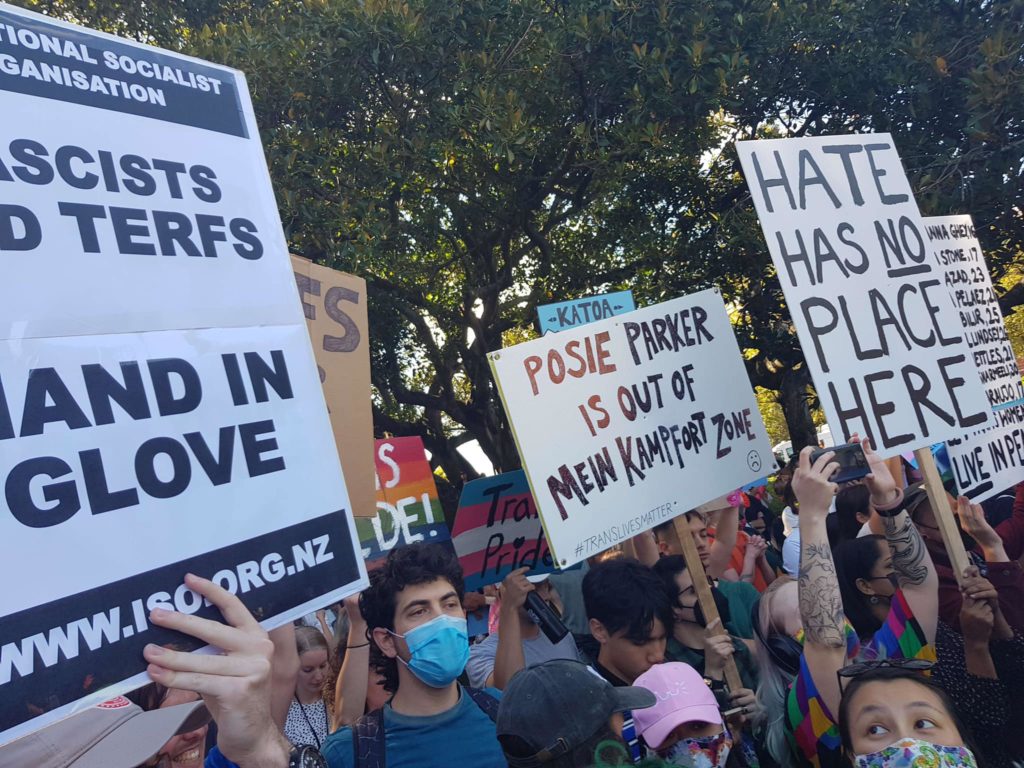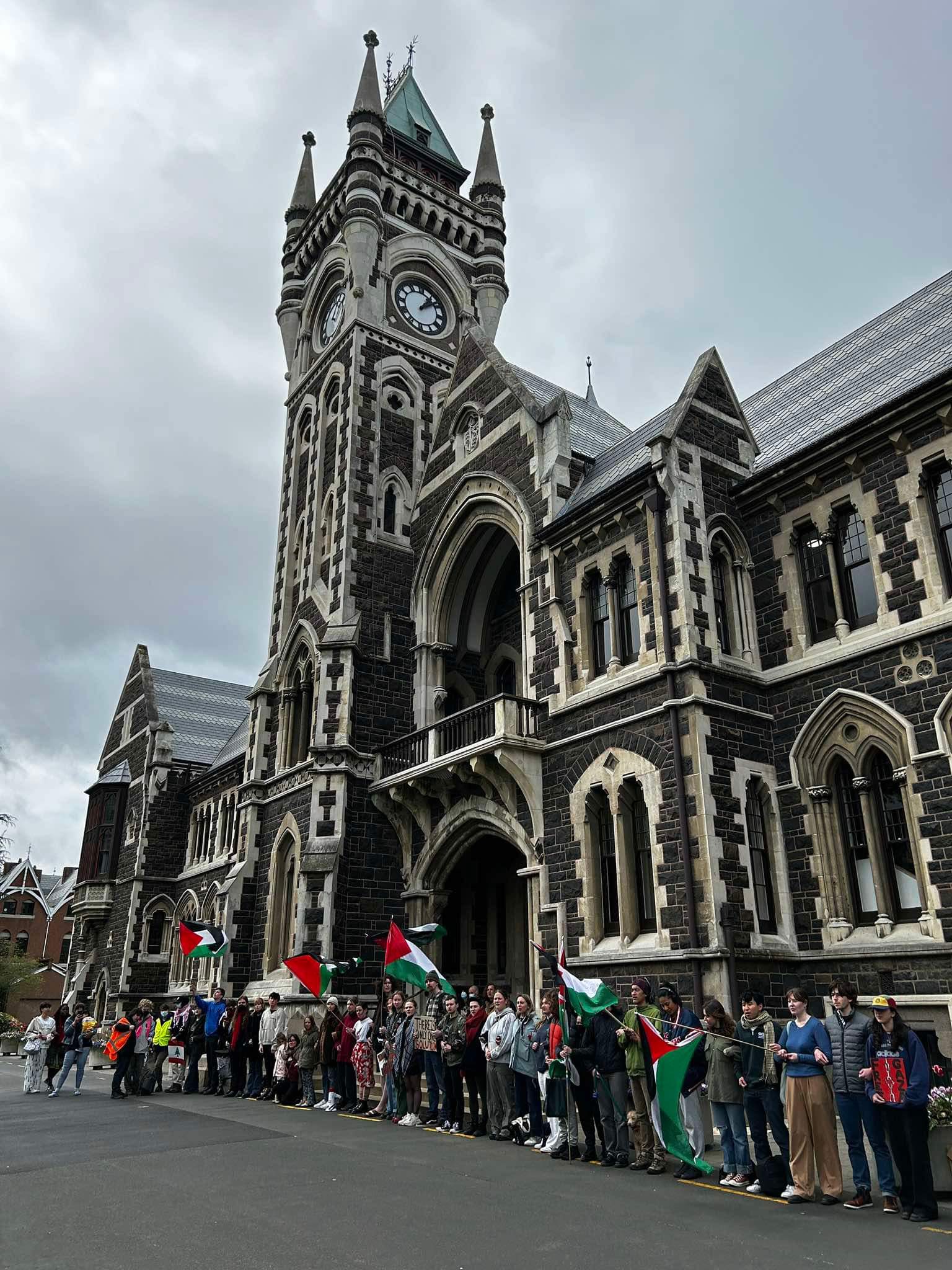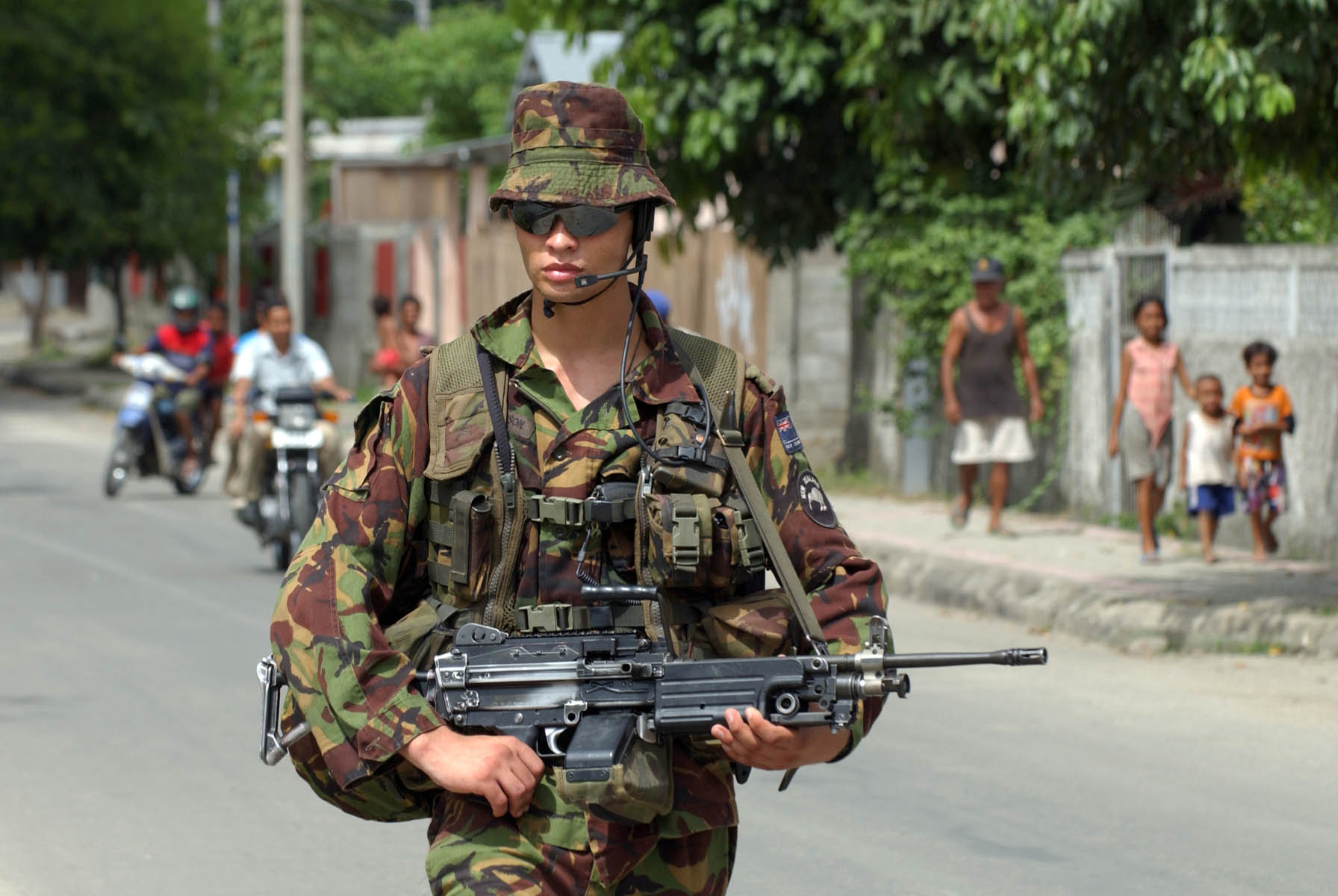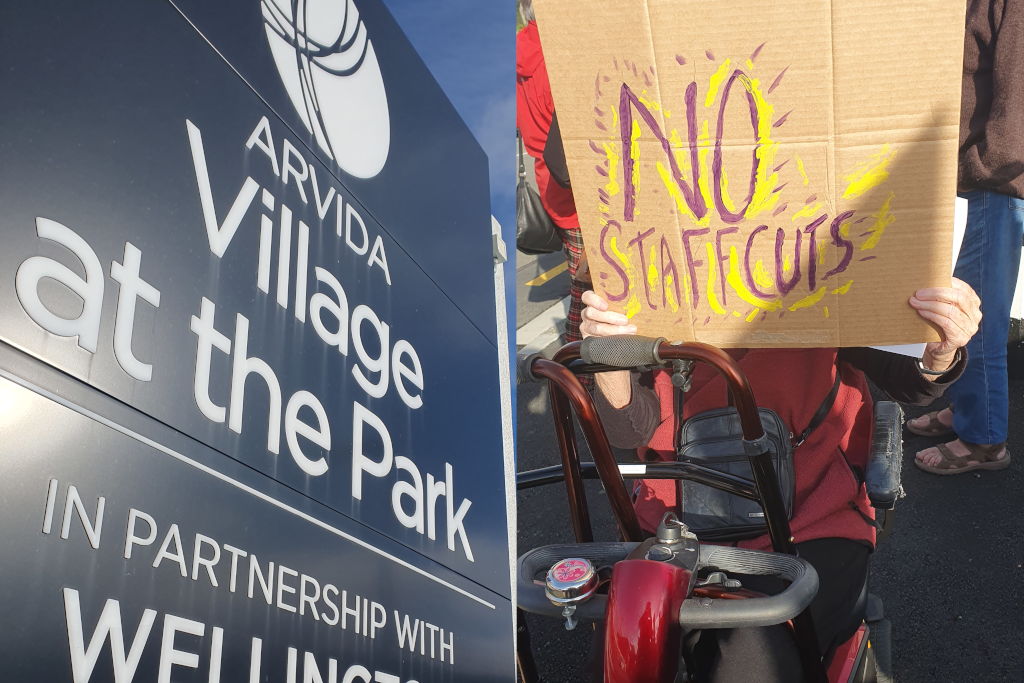On Saturday 11th of February 2023, three members of the International Socialist Organisation Te Whanagnui-a-Tara branch attended a rally for trans rights, focused on healthcare demands. The rally organiser, addressing a crowd of about 500 people, spoke passionately about her experiences as a young trans woman in Aotearoa and about how she had been forced to move across the country to escape transphobic situations. Included in her speech were these key demands:
- Fully fund ALL gender affirming surgeries outlined in World Professional Association for Transgender Health (WPATH) guidelines, and remove the ‘cosmetic’ label when referring to trans healthcare surgeries such as breast augmentation or facial feminisation surgery.
- Establish partnership with Māori in reaching takatāpui / irawhiti health goals and remove Pākehā measures of gender incongruence.
- Increase funding for, and investigate barriers to accessing, gender affirming surgeries; and lower the referral age for surgery, and the age required to legally change one’s own name, to 16.
- Remove ALL financial barriers for Births, Deaths, Marriages, and Relationships Registration (BDMRR) -related costs on the basis of gender incongruity with legal documents; and fund rainbow community groups for initiatives around accessing gender affirming clothing.
- Fully fund the most efficient, safe and contemporary medicines for care of transgender people, such as funding oestrogen injections, implants, and transdermal gels; and review the Professional Association for Transgender Health Aotearoa (PATHA) guidelines WITH consultation of transgender people of all demographics.
Subsequently, there was an ‘open microphone’ opportunity for all protestors to make contributions. Many transgender people shared their stories of struggling to get the medical care that they need. Stories of being forced to turn to sex work or go overseas to access care not available on any reasonable timescale from the public health system. About how the waitlist for gender affirming genital surgery was *reduced* to 12 years by an increase in funding in 2017. Of access to necessary care being a postcode lottery, dependent on which regional health services covered you. Of struggling with the question of if they’re “trans enough”, if they’re “valid enough”. Of people struggling to live happy, dignified lives.
We heard from people of many backgrounds, united in telling stories of how Aotearoa’s health system has failed them. Of a demand for better, for a more humane system that puts the needs of people over the needs of capital. Following on from speeches, we marched from parliament grounds along Lambton Quay to Te Ngākau Civic Square. Five hundred people marching out and proud with banners, demanding change. Many vehicles honked support. The energy of the protest was amazing, with so many people making so much noise in support of our needs. Standing together to support us all.
There are many health care failings for trans people. From the top down, the systems trans people are forced to interact with to receive the care we need simply are not designed with transgender or gender non-conforming people in mind: Surgical teams simply do not have the resources available to provide anything even close to the level of demand, with 10 patients seen in the last year and over 100 new referrals added to the waiting list in that same period; Inconsistently applied policies between different regions; Pharmac funding some but not all medications used in hormone replacement therapy. Some healthcare providers are supportive, but many trans people encounter unnecessary barriers to referral to specialist services. Some healthcare providers seem ignorant of the need to, or unwilling to, get pronouns correct, or to treat trans patients with the basic respect every person deserves.
International Socialist Organisation members support the right of transgender people to be respected and supported in their healthcare needs. As stated in our organisation’s Where We Stand statement: “All forms of liberation are essential to socialism and impossible without it.” Towards that aim, the mobilisation of hundreds of people in the streets was a significant step, but our efforts cannot end there. Ongoing education through our media, further targeted support and mass rallying is needed.
In the face of a TERF tour
On the 25th of March 2023, renowned UK-based agitator Kelly-Jay Keene-Minshull (aka Posie Parker) attempted to speak at Albert Park in Tāmaki Makaurau. Parker is renowned as an outspoken Trans-Exclusionary Radical Feminist (TERF). Like many so-called TERFs, Parker’s politics are reactionary rather than radical, and her work undermines the rights of both trans- and cis-gender women, suggesting her politics are not feminist either.
Parker’s speech was counter-protested by thousands of trans people and their allies. The crowd’s chanting and cheers rang in the park, the counter protest clearly massively outnumbering the handful of people who had come to hear and support Parker’s bigotry. In short order, Parker withdrew from the rotunda she had initially occupied, escorted through the crowd of protestors by her security group and police. The counter protestors celebrated with speeches and waiata, demonstrating the power of organized collective action to overcome divisive forces. Later that day, Parker departed Aotearoa to return to the UK, cancelling her earlier plan to speak in Te Whanganui-a-Tara on the following day.
Despite Parker’s departure, Te Whanganui-a-Tara -based activist group Queer Endurance/Defiance (QED) elected to proceed with plans for a rally in that city on the 26th of March. What had originally been intended as a rally to counter Parker instead turned into a celebration of trans lives and bodily autonomy for all. With Parker’s event cancelled and no strong appearance from other TERFs, the celebration filled Te Ngākau Civic Square, packing it out with over 4,000 people in what may be the largest rally for trans rights in Aotearoa ever. Speakers at the rally spoke powerfully about the need for solidarity and class consciousness in addressing the rise of the far right and anti-trans narratives. Speakers came from across the left, including members of the International Socialist Organisation, International Bolshevik Tendency, Fired Up Stilettos, and independent speakers. Multiple unions showed up in solidarity with the queer community and women, flying banners to make their presence and support explicit and proud. Activist groups, lobby groups, and students’ associations united in their support of this kaupapa.
The rally in Te Whanganui-a-Tara was a resounding success, with minimal opposition. One TERF infiltrated the crowd and was successfully managed by the marshal team. A small group of suspected fascists saw the crowd and the marshal team and promptly left – in our opinion clearly aware they would be unable to cause any disruption on this occasion. Again, this shows the power of mass movements to oppose far right forces. In all locations, the right wing was simply unable to rally the numbers to prevent trans and women’s rights from being celebrated.
What all of this means
During the latter part of the 20th century, transgender people were sometimes excluded from spaces operated by otherwise radical feminist groups, such the infamous USA Michigan Womyn’s Music Festival. While at least in Aotearoa there has been a general gradual increase in awareness and acceptance of transgender people living their lives authentically, that progress has been resisted by a minority subset of feminists who hold on to the misguided belief that trans people pose a threat to them. Conversely, the data shows it is transgender people who are at most at risk and not the other way around. Transgender people are much more likely than the general population to be abused, to be assaulted, to be made homeless, and to attempt suicide. The limits of social acceptance, and the limits of trans-affirming healthcare, produce dire consequences for trans people which simply do not support the TERF trans-as-a-threat narrative.
Even more concerning for trans people, though, is the way in which the far right has picked up on TERF talking points and integrated these as one of the core parts of their propaganda. Being a target of fascists is not a new phenomenon for queer people generally – queer people were one of many groups in 1930s Germany the Nazi party specifically targeted, claiming a risk of ‘degenerate’ influence on ‘culture’. But as we watch a conservative USA lobby group fund a UK TERF to travel to Aotearoa to drum up transphobia, and as we observe far right groups within Aotearoa agitate with mock outrage about “free speech” and “protecting women”, we get a strong sense that transgender people are once again a priority target for far right hate. That sense was validated as we saw open fascists rallying in Naarm Melbourne, then saw somewhat more discreet yet identifiable fascists on the periphery in Aotearoa.
The far right is useful to capitalism because it is proficient at setting the working class against itself. The free existence of transgender people threatens the reproduction of capitalist social structures including the very concept of nuclear families. However, the framing of trans people as an “out group” and as targets of suspicion and hate serves capitalism by distracting the working class from noticing who their true oppressors are. In this respect, transphobia is wielded in the same ways as racism and xenophobia have been, and notably wielded by very similar actors. It’s quite possible that people like Posie Parker are merely useful idiots in this process, but the forces who support her rhetoric must be fought as both an act of solidarity with trans comrades and as a part of the ongoing struggle against capitalism more generally.
And this is what is so powerful about the recent trans rights rallies. In February, hundreds took to the streets in Te Whanganui-a-Tara and showed they stood up for the wellbeing of transgender comrades. Then in March, in the face of a more apparent threat, we saw mass rallies in Tāmaki Makaurau, Te Whanganui-a-Tara, Ōtautahi, and Ōtepoti. In response to the right wing threat, nearly 10,000 transgender people and their allies came out in public to reject hate and to celebrate community. Widespread union support in these rallies suggests the awakening of a working class consciousness that had been sorely lacking for some time. And we’ve seen our comrades, not exclusively transgender but everyone, begin to build to rekindle the skills of mass organising and begin to get a taste of the effectiveness of that collective mahi. These past couple of months have been a win for transgender people’s security within Aotearoa, and a simultaneous very significant win for the entire working class.









